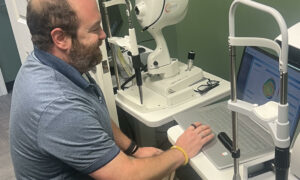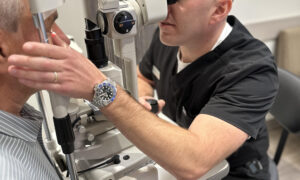
Dr. David Grosswald, OD. Dr. Grosswald is a specialist in scleral lens and Ortho-K fittings. He is a member of Healthcare Registries Advisory Panel as Chairman of the Scleral Lens Registry.
Ensuring the exam information you share is accurate.
By James E. Grue, OD,
Ronald P. Snyder, OD, FAAO,
and Michael J. Lipson, OD, FAAO, FSLS
May 1, 2024
When medical data is shared among providers, the integrity of the data is paramount. It ensures that the information being transmitted is accurate, complete and consistent, which is crucial for making informed clinical decisions.
What is “Data Integrity”?
The easiest way to recognize the importance of data integrity is to think of it in terms of trust. Providers who use paper records or early versions of EHRs were not able to easily share your exam information, so they trusted their data. They knew everything about how it was collected, the decision-making process on what and how things were recorded, and how they would use the information.
That all changes as we enter a new phase of healthcare reform where information-blocking rules make providers’ data available to the patient, all other providers on the patient care team and anyone else the patient authorizes to use their healthcare information.
Other Articles to Explore
Other care team members, who depend on your data, do not know how the information they have received from you was collected or the decision-making processes that you followed regarding the importance of any specific piece of data. They will likely use the test results in a completely different way than you would have.
Keep in mind that the whole purpose of healthcare reform in this country is to improve patient outcomes and to decrease cost.
Ending “Information Hoarding”
One of the most important aspects of the transformation is interoperability, which frees up patient health information so that it is where it is needed and available when it is needed. The new information-blocking rules are designed to make that happen through a regulatory process to end what is referred to as “information hoarding,” which is commonly done in traditional healthcare by providers and EHRs.
As providers, we need to consider how others will use the information we gather during our exams. Every patient has a care team, and as the eyecare provider who performed their annual exam, you are a part of that care team. Every other provider on that patient’s care team will look toward the information you provide as the source of the patient’s baseline ocular findings.
But the information-blocking rules go much further. These new rules make your exam results available to any organization your patient authorizes.
More People Will Be Requesting Access to Patients’ Health Records

To learn more: 844.393.3282. (toll free) or ContactUs@HealthCareRegistries.com
There is strong evidence that sports teams will request access to a player’s eye exam records. It is likely that it will become routine for participants on sports teams to give blanket authorization to the team trainer to be able to access their medical information, which would include their eye exam.
For example, to rule out a suspected concussion, a sports trainer for a college football team is going to be interested in assessing pupils in a completely different way than you would during an eye exam. It may not seem important for you to diagnose anisocoria, and to add the player’s diagnosis of anisocoria to the problem list, but it is very important to a trainer who must evaluate a player’s pupils every time there is a suspected possible concussion injury. The trainer may view the accuracy of the pupil findings completely differently.
How Will Outside Organizations Access Your Exam Information?
If you are not sure how these outside organizations will access your exam information, we recommend that you read our previously published article, “What is FHIR & Why Does Matter to Your Practice?”
Every time you complete an exam, your certified EHR is required to forward your exam summary to a FHIR server. Other authorized organizations will access your exams from there and you will not even know they have accessed the information.
The exams you are doing today are already being made available through these FHIR servers, so it is important you are aware that others have access to your exam results.
You likely put considerable effort into delivering care that you consider to be high quality. It is important that the integrity of the information your office makes available to others is accurate, consistent and complete, so it reflects the quality of care you strive to deliver.
 James E. Grue, OD, is a health-care reform speaker and consultant. To contact him: JimGrue@HealthCareRegistries.com
James E. Grue, OD, is a health-care reform speaker and consultant. To contact him: JimGrue@HealthCareRegistries.com
 Ronald P. Snyder, OD, FAAO, is the president and CEO of HealthCare Registries, LLC. To contact him: RonSnyder@HealthCareRegistries.com
Ronald P. Snyder, OD, FAAO, is the president and CEO of HealthCare Registries, LLC. To contact him: RonSnyder@HealthCareRegistries.com
 Michael J. Lipson, OD, FAAO, is the chairman of the OrthoK Advisory Panel of HealthCare Registries, LLC.
Michael J. Lipson, OD, FAAO, is the chairman of the OrthoK Advisory Panel of HealthCare Registries, LLC.























